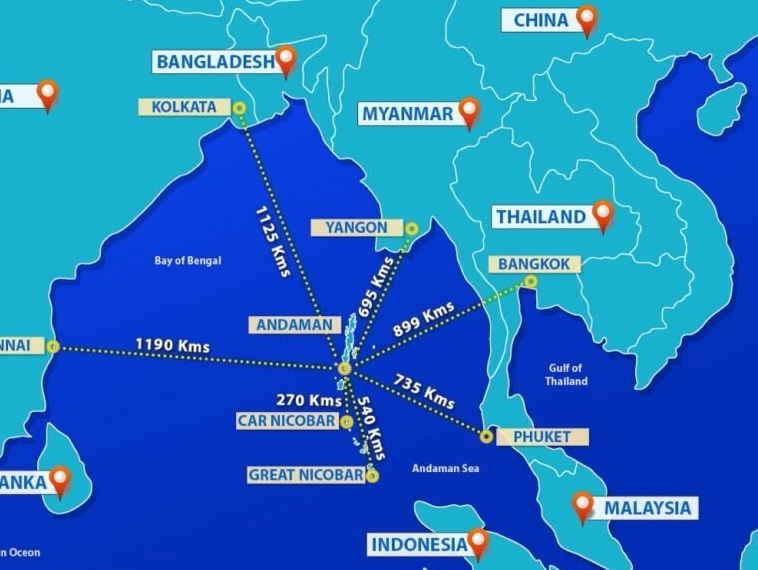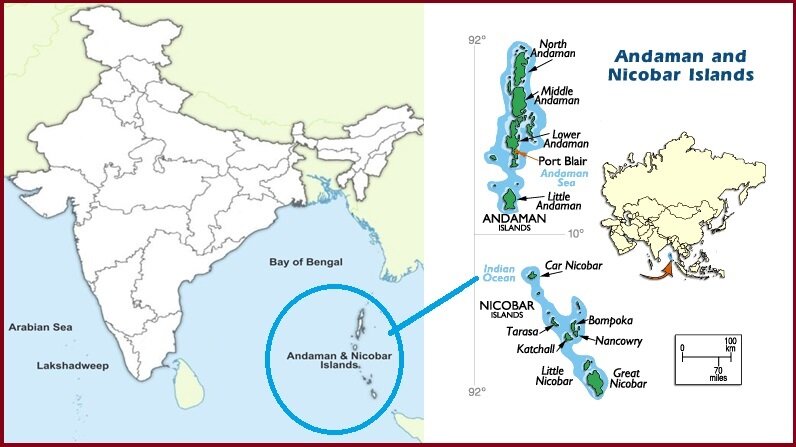Governance
Andaman and Nicobar Islands to be Maritime and Startup Hub
- 10 Aug 2020
- 6 min read
Why in News
Recently, the Prime Minister has declared that the Andaman and Nicobar islands will be developed as a "maritime and startup hub".
Key Points
- A transhipment hub has been proposed in the Andaman and Nicobar islands.
- A transshipment is when cargo or a container is moved from one vessel to another while in transit to its final destination.
- It will be built in South Bay, Great Nicobar Island, to provide Indian shippers an alternative to the Colombo (Sri Lanka), Singapore and Port Klang (Malaysia) transshipment ports.
- 12 islands of the archipelago have been selected for high-impact projects with an emphasis on boosting trade of sea-based, organic and coconut-based products of the region.
- A submarine cable project has been launched in the islands to make it digitally independent.
- 2300 Km of submarine optical fibres cable (OFC) have been laid down
- The fibre will connect chennai and port blair and seven other islands- Swaraj Deep (Havelock), Long island etc.
- The connectivity project was funded by the Centre through the Universal Service Obligation Fund under the Ministry of Communications.
- It was executed by Bharat Sanchar Nigam Limited (BSNL) and Telecommunications Consultants India Limited (TCIL) was the technical consultant.
- In addition, Port Blair airport is to be expanded and some of the islands will be also connected with seaplanes.
- Background:
- In 2015, the government had announced an ambitious, Rs 10,000 crore economic plan to transform the Andaman and Nicobar Islands into the country’s first maritime hub.
- This included infrastructure construction, protection of the original Jarawa inhabitants and boosting the tourism potential.
- Earlier, India had also invited global investors to develop the Andaman & Nicobar and Lakshadweep islands.
- The Union Government constituted the Island Development Agency on 1st June, 2017 for the development of islands.
Benefits
- Governance:
- Better connectivity in the region will facilitate the delivery of e-governance services such as telemedicine and tele-education, as a part of Digital India initiative.
- The region will play an important role in his government's self-reliant India project.
- Economic:
- Small enterprises, Business Process Outsourcing Services and other medium and large enterprises will also benefit from better connectivity and opportunities in e-commerce,
- This can be leveraged to promote the government’s Startup India initiative.
- The internet costs will also come down and it will give a boost to tourism and the local economy.
- The building of a transshipment hub will be critical for India’s trade and help the group of islands become an important centre of the blue economy.
- Small enterprises, Business Process Outsourcing Services and other medium and large enterprises will also benefit from better connectivity and opportunities in e-commerce,
- Strategic:

- The islands are critical for India's security because of their strategic location in the Indian Ocean Region (IOR). Better infrastructure and connectivity will help India enhance its military and naval strength in the islands.
- The islands are home to India's only tri-services command, the Andaman and Nicobar Command (ANC) which is strategically important, more so, on the backdrop of the Chinese aggression in the region.
- Earlier this year, China was accused by Vietnam of sinking its sea in its Exclusive Economic Zone.
- International Relations:
- It will also help India to build better economic relations with ASEAN region.
- The importance of the islands has increased in light of India's 'Act East' policy.
Submarine Communications Cable
- It is a cable laid on the seabed between land-based stations to transmit telecommunication signals across stretches of ocean and sea.
- The optical fibre elements are typically coated with plastic layers and contained in a protective tube suitable for the environment where the cable will be deployed.
- Compared to satellites, using internet connection through submarine cables is more reliable, cost efficient and of large capacity.
Universal Service Obligation Fund (USOF)
- USOF ensures that there is universal non-discriminatory access to quality ICT services at economically efficient prices to people in rural and remote areas.
- It was created under the Department of Telecommunications in 2002.
- It is a non-lapsable fund, i.e., the unspent amount under a targeted financial year does not lapse and is accrued for next years’ spending.
- All credits to this fund require parliamentary approval and it has statutory support under Indian Telegraph (Amendment) Act, 2003.
Way Forward
Provision of reliable, robust, and high-speed telecom and broadband facilities in these islands will be a landmark achievement from the viewpoint of consumers, as well as for strategic and governance reasons.





